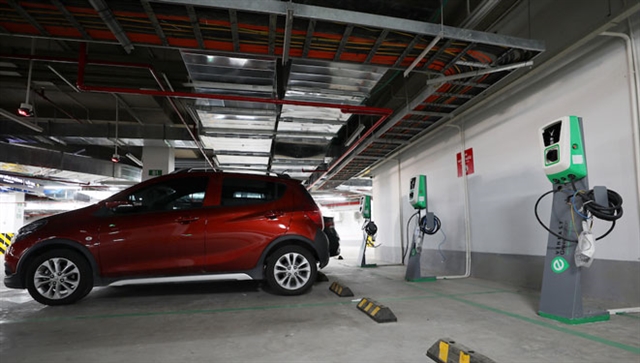 Economy
Economy


|
| VinFast charging stations in an apartment complex in Hà Nội. — Photo nld.vn |
HÀ NỘI — Slashing registration fees by half for electric vehicles (EVs) may cost the State budget as much as VNĐ8.6 trillion (US$380 million) a year, said the latest report by the Ministry of Finance.
The cut was needed to boost domestic demand for EVs, a key component of a greater effort by the Government to reduce greenhouse emissions and reliance on traditional fossil fuels, according to the ministry.
Việt Nam has but one maker of EVs: VinFast, a member of the conglomerate organisation Vingroup, which can produce up to a quarter of a million vehicles a year. As of now, VinFast's EVs retails at VNĐ690 million per unit (not including the battery), significantly more expensive than its internal combustion-engine counterparts with the same number of seats, which typically cost around VNĐ420 million.
Sales of EVs in the short run, however, are unlikely to increase significantly as the new generation vehicles have been struggling to deal with problems including limited production capacity, lack of charging stations and relatively high cost of ownership.
In addition, sales of EVs have been projected to experience growth mostly in large cities where the required technology and infrastructure for their operations may be implemented easily. In that case, the effect it may have on State budget collection in the near future will likely be less profound.
Meanwhile, VinFast has been working on its own incentive programmes. It has offered a number of financial benefits and technical assistance for residential areas that were willing to set up charging stations for its EVs.
By the end of 2020, the number of newly registered EVs was just a bit north of 1,000 or just around 0.15 per cent of all newly registered cars across the country, according to an estimate by the Vietnam Automobile Manufacturers' Association (VAMA).
The current proposal by the ministry is to keep the registration fee for new EVs at half of what it costs for internal combustion-engine vehicles for a period of five years. Notably, the preferential treatment will not apply to sales of used EVs. In other words, owners of used EVs would still have to pay the same amount in registration fee as everyone else.
Another proposal to eliminate registration fees for EVs, which has been axed by the ministry, was said to result in a VNĐ17.25 trillion reduction to the State budget.
Either way, the cut will likely affect the State's coffers as vehicle registration fees have grown to be a large part of State budget collection in recent years. Registration fees for cars accounted for 69 per cent of the total registration fees for all vehicles in 2017, 70 per cent in 2018, 74.6 per cent in 2019 and 79 per cent in 2020.
The proposal, once approved, is to be the first move to encourage the adoption of EVs in the domestic market. Other markets in the region including Thailand and Indonesia have introduced a number of incentives to boost the sales of EVs, according to industry experts. — VNS




